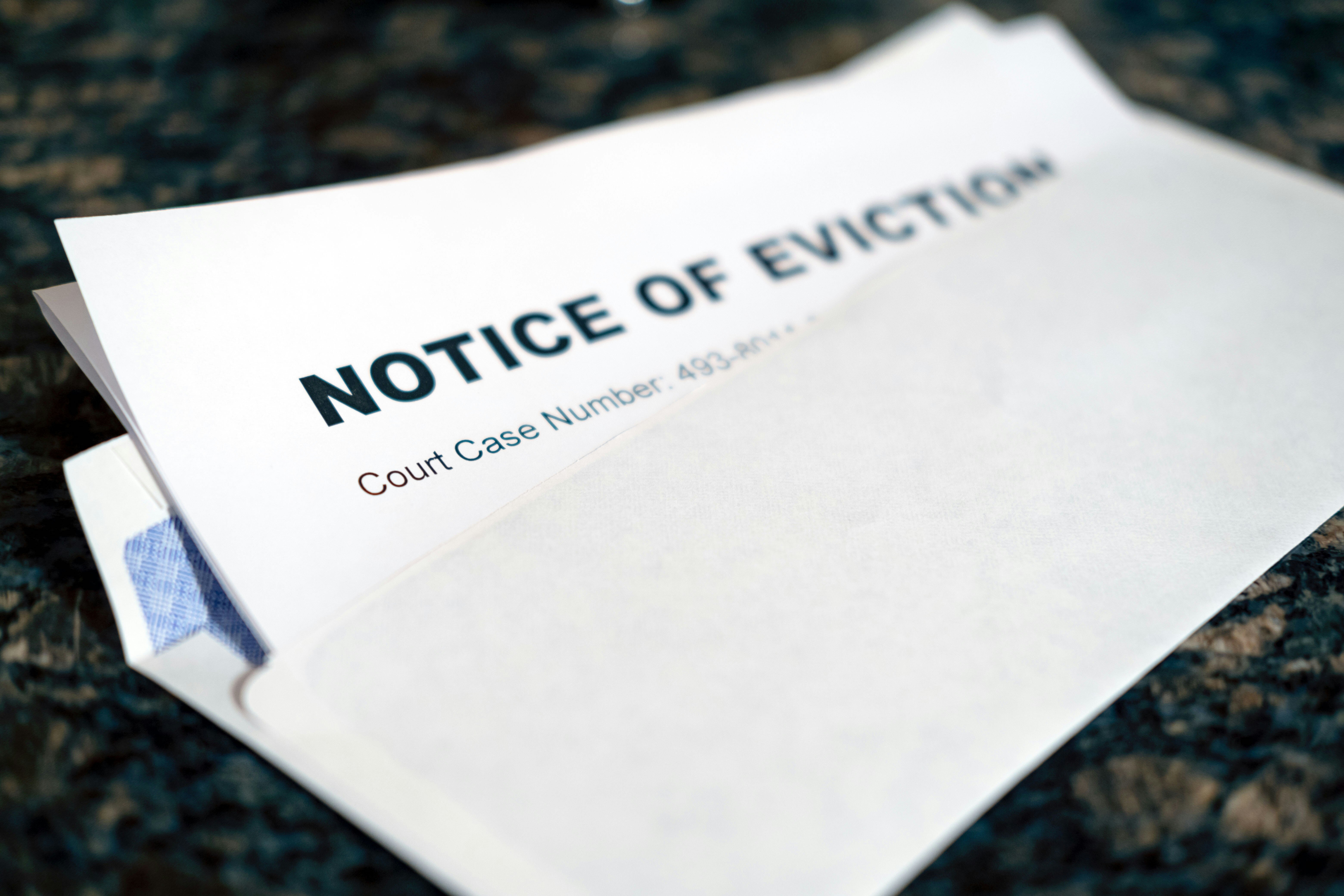Days
Hours
Minutes
Seconds
May 1 2026 - Renters' Right Act Commencement Day
You have 0 days to:
Serve any final Section 21 notices
Stop accepting above-asking rent offers
Prepare for the rental bidding ban
Remove “No DSS” from adverts
Remove “No Children” from listings
Show one clear rent price
Stop using fixed-term agreements
Switch to periodic tenancy templates
Check which tenancies go periodic
Stop taking rent before signing
Take no more than one month’s rent
Move all evictions to Section 8
Train staff on new notice rules
Create Section 13 process flow
Add two months to rent reviews
File court claims for Section 21s
Update landlord move-in grounds
Update landlord selling grounds
Send the RRA Information Sheet
Create written terms where missing
Update How to Rent processes
Review tenant screening questions
Update pet request processes
Stop backdating rent increases
Discuss rent protection backbooks
Act now before it is too late...
What is a Section 8 Notice? (And How To Serve One)
Now that the Renters' Rights Act has been passed, Section 8 notices will become the main way to evict tenants. Here’s what letting agents need to know.
The Goodlord team
Nov 11, 2024
Updated May 1, 2025
Section 21 repossessions will soon disappear as the Renters’ Rights Act has now become law.
With no-fault evictions out of the picture, letting agents need to know how to serve a Section 8 notice, which will become the main way to evict tenants.
The problem?
Section 8 notices rely on specific grounds for possession and have to be processed through the courts. Courts that already have significant backlogs.
So not only will legal costs rise, but landlords also stand to be out of pocket for longer when tenants are in arrears.
In this blog, we'll teach you everything you need to know about Section 8 notices, while also revealing to you how you can prepare your agency and clients for these changes.
- What is a Section 8 notice?
- How to serve a Section 8 notice
- How can you best prepare your agency for the changes to eviction notices?
What is a Section 8 notice?
A Section 8 notice, issued under the Housing Act 1988, allows landlords to end tenancies early when the tenant breaches specific terms of their agreement. Common grounds for this include tenants who are in rent arrears or who use the property as a base for illegal activity.
Unlike Section 21, Section 8 must be based on specific legal grounds - either mandatory or discretionary. Mandatory grounds are firm reasons for eviction, while discretionary grounds require letting agents and landlords to provide justification and proof for eviction.
What grounds can be used for a Section 8 notice?
Under Section 8, there are 18 grounds for possession, divided into mandatory and discretionary categories. When working on behalf of landlords, letting agents must provide evidence for the grounds they cite, and notice periods will vary depending on the situation.
Landlords can issue a Section 8 notice at any point during a tenancy unless the grounds specifically state otherwise. The ground requiring the longest notice period applies if multiple grounds are mentioned.
Mandatory grounds
If a mandatory ground is proven, the court must grant possession to the landlord. The notice periods for these grounds can range from two weeks to four months.
These grounds are:
- Ground 1 (Amended) - If the landlord or a family member wishes to move into the property, this can only be done after the tenancy has exceeded 12 months
- Ground 1A (New) - If the landlord intends to sell the property, this can only be used after the tenancy has exceeded 12 months
- Ground 2 - If the mortgage provider wishes to repossess the property
- Ground 2ZA - 2ZD (New) - If the leasehold has ended and the landlord does not own the freehold
- Ground 4 - If a property was let to a student by an educational institute for a fixed term of 12 months
- Ground 4A (New) - For student landlords not affiliated with an educational institution who need the property for new student tenants before the academic year starts
- Ground 5 - If a religious organisation owns the property and needs a minister of religion to live in
- Ground 6 - If a landlord wishes to demolish or redevelop the rented property to the extent that the tenant cannot live there
- Ground 6A (New) - If the landlord needs possession to comply with an enforcement action
- Ground 7 - If a tenant has passed away, but this cannot be used if a surviving spouse is living on the property
- Ground 7a - If the tenant has committed "serious anti-social behaviour"
- Ground 7b - If the tenant does not have a right to rent in the property
- Ground 8 (Amended) - If the tenant is at least three months in arrears (or 13 weeks if rent is paid weekly or fortnightly)
Discretionary grounds
Discretionary grounds allow the court to decide whether eviction is justified. These are often used in cases involving minor breaches or tenant misconduct.
Discretionary grounds include:
-
- Ground 9 - If a landlord has provided accommodation that is like-for-like for the current tenancy
- Ground 10 - If the tenant is in rent arrears but is less than ground 8
- Ground 11 - If the tenant is constantly late in paying rent, but is not in rent arrears
- Ground 12 - If the tenant has breached the tenancy agreement, excluding rent payments
- Ground 13 - If the tenant has deteriorated or neglected the landlord's property
- Ground 14 - If the tenant is a nuisance or annoyance to neighbours, or using the property for illegal or immoral activity
- Ground 14A (New) - Social landlords can evict a domestic violence perpetrator if the victim has fled
- Ground 14ZA (New) - If the tenant or adult at the property has been convicted of an indictable offence during a UK riot
- Ground 15 - If the tenant caused damage to furniture provided by the landlord
- Ground 17 - If the tenant was given the tenancy with a "false statement"
- Ground 18 (New) - The tenancy is for supported accommodation, and the tenant refuses to engage in support
Goodlord's Managing Director of Insurance, Oli Sherlock, and leading property lawyer, David Smith, discuss Section 8 evictions and a wide range of other Renters' Rights Act topics ☝️
How to serve a Section 8 notice
To serve a Section 8 notice, letting agents and landlords must download and complete Form 3 from the Government website. This form must be served in accordance with the terms of the tenancy agreement.
Agents and landlords should maintain a clear audit trail and, if applicable, solid evidence of tenant breaches to support the grounds for possession. Missing key information can lead to delays or an invalid notice, potentially allowing tenants to stay in the property.
Suppose the tenants don't leave the property after the allotted notice period, depending on the ground provided. In that case, lettings agents and landlords will need to apply to the court for a possession order.
If a landlord or letting agent is unsure, they should seek legal advice on serving a Section 8 notice and the notice period to be provided.
When can a Section 8 notice be served?
A Section 8 notice can be issued anytime after a breach occurs during an assured or assured shorthold tenancy. It can be served if the tenant breaches the terms or if the landlord needs the property for an approved reason.
Each ground has a specific notice period that agents must adhere to. Letting agents and landlords must know the prerequisites for certain Section 8 grounds. It could be considered invalid if the correct information isn’t completed before the section is served.
When is a Section 8 notice not valid?
Letting agents and landlords must ensure all information on Form 3 is complete and correct before issuing it. Essential details include:
- Tenants' names
- Address of the property
- Grounds for possession
- Notice period date
The court may dismiss the notice if the grounds or notice period are incorrect. For multiple grounds, the longest applicable notice period typically applies. The landlord must also allow time for the notice to be deemed served in line with the Civil Procedure Rules requirements. If they do not allow time for this, the notice period will never be correct.
What happens once a Section 8 is served to a tenant?
Once the landlord serves a Section 8 notice, the tenant has until the end of their notice period to stop any breaches of tenancy. At the end of the notice period, the landlord can start court proceedings if their tenants do not stop any breaches or vacate.
This is also the case if a landlord wishes to serve a Section 8 notice so they can either sell or move back into the property.
If the tenant doesn’t move out, the landlord can apply to the court for a possession order. Tenants may challenge this, presenting a defence to the court or requesting extra time due to “extreme hardship.”
Before the court hearing, agents must compile and submit all relevant case documents electronically.
If the possession order is granted, the landlord must seek enforcement if the tenant doesn’t leave. This means that county court bailiffs or High Court Enforcement Officers (HCEO), if requested in the application, can proceed with eviction, with at least 14 days' notice given beforehand.
How long does a Section 8 claim take?
Court proceedings can start once the Section 8 notice period ends. The current government guidelines estimate an 8-week wait for a hearing.
If any cases escalate further and require county court bailiffs or HCEO intervention, a landlord could face longer delays in reclaiming possession of their property.
In high-demand areas, agents and landlords may wait up to nine months for an eviction, potentially leading to substantial rent arrears for the landlord and, subsequently, the letting agent.
These timelines are highly likely to increase now that the Renters' Rights Act has become law.
During the Commons Committee Stage of the Act, Conservative MP Jerome Mayhew stressed the need to strengthen the court system before Section 8 becomes the sole eviction process.
Mayhew noted: “When we move to a Section 8 ground, that will require more resources and scrutiny, quite rightly, but without investment in the court system, we will not deliver what either renters or landlords need.”
Despite some clarifications made by Baroness Taylor of Stevenage in the second reading in the House of Lords, many industry experts feel these concerns remain unaddressed.
How can you best prepare your agency for the changes to eviction notices?
Lettings professionals can take several key steps to future-proof their agencies, including:
Investing in staff training
While Section 21 is still a lever your landlords can pull in the short term, everyone in your organisation needs to know how to serve a Section 8.
After all, landlords are becoming increasingly savvy about the Renters' Rights Act and are likely to ask you questions about it, if they haven't already. Being unable to answer them could not only make you look unprepared but also cost you potential business.
According to Government data, 49% of landlords say they don't use an agent. You have an opportunity to pitch your expert services to this part of the market, while also upselling your existing clients.
Investing in robust referencing
One of the best things letting agents can do to prepare for the increased reliance on Section 8 is to place respectful, dependable tenants in their landlords’ properties. This will prevent you from serving Section 8s in the first place.
Investing in robust referencing will help you to achieve this. For example, Goodlord's PRO referencing package includes:
- Credit checks
- Instant identity document authentication
- Right to rent documentation collection
- Residential checks
- Income checks, including Open Banking, HMRC, and payroll providers
This gives you the best possible chance of avoiding the courts.
Investing in rent protection and legal cover
Now that the Renters' Rights Act has become law, we’re likely to see an increase in landlords serving Section 21 notices. In turn, this is likely to result in a rise in property dilapidation and the number of tenants who end up in arrears.
After the Renters’ Rights Bill becomes law, legal costs for landlords will significantly increase, and backed-up courts will result in longer periods of tenants in arrears.
Both of these factors make it essential to make contingency plans.
Goodlord's Rent Protection and Legal Expenses Insurance gives landlords peace of mind, covering tenants’ rent (up to £100K) while they’re in arrears and the legal costs involved in the eviction process. We'll also mediate between tenants and landlords to prevent court proceedings from happening in the first place.
Conclusion
While highly controversial, the shift towards Section 8 isn't all doom and gloom. But to take advantage of the opportunities it presents, you need to grasp the nettle now.
This article is intended as a guide only and does not constitute legal advice. For more information, visit gov.uk.





